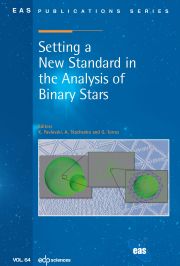No CrossRef data available.
Article contents
Constraints on the Clumpiness of Dark Matter Halos Through Heating of Disk Galaxies
Published online by Cambridge University Press: 22 December 2003
Abstract
Motivated by the presence of numerous dark matter clumps in the Milky Way's halo as expected from the cold dark matter cosmological model, we conduct numerical simulations to examine the heating of the disk. We construct an initial galaxy model in equilibrium, with a stable thin disk. The disk interacts with dark matter clumps for about 5 Gyr. Three physical effects are examined: first the mass spectrum of the dark matter clumps, second the initial thickness of the galactic disk, and third the spatial distribution of the clumps. We find that the massive end of the mass spectrum determines the amount of disk heating. Thicker disks suffer less heating. There is a certain thickness at which the heating owing to the interaction with the clumps saturates. We also find that the heating produced by the model which mimics the distribution found in Standard CDM cosmology is significant and too high to explain the observational constraints. On the other hand, our model that corresponds to the clump distribution in a ΛCDM cosmology produces no significant heating. This result suggests that the ΛCDM cosmology is preferable with respect to the Standard CDM cosmology in explaining the thickness of the Milky Way.
- Type
- Research Article
- Information
- Copyright
- © EAS, EDP Sciences, 2003




